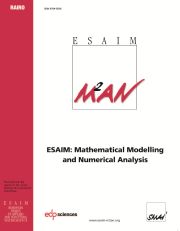No CrossRef data available.
Article contents
A fictitious domain method for the numerical two-dimensionalsimulation of potential flows past sails
Published online by Cambridge University Press: 10 June 2011
Abstract
This paper deals with the mathematical and numerical analysis of asimplified two-dimensional model for the interaction between the windand a sail. The wind is modeled as a steady irrotational plane flow pastthe sail, satisfying the Kutta-Joukowski condition. This conditionguarantees that the flow is not singular at the trailing edge of thesail. Although for the present analysis the position of the sail istaken as data, the final aim of this research is to develop tools tocompute the sail shape under the aerodynamic pressure exerted by thewind. This is the reason why we propose a fictitious domain formulationof the problem, involving the wind velocity stream function and aLagrange multiplier; the latter allows computing the force densityexerted by the wind on the sail. The Kutta-Joukowski condition isimposed in integral form as an additional constraint. The resultingproblem is proved to be well posed under mild assumptions. For thenumerical solution, we propose a finite element method based onpiecewise linear continuous elements to approximate the stream functionand piecewise constant ones for the Lagrange multiplier. Error estimatesare proved for both quantities and a couple of numerical testsconfirming the theoretical results are reported. Finally the method isused to determine the sail shape under the action of the wind.
- Type
- Research Article
- Information
- ESAIM: Mathematical Modelling and Numerical Analysis , Volume 45 , Issue 6 , November 2011 , pp. 1033 - 1058
- Copyright
- © EDP Sciences, SMAI, 2011


